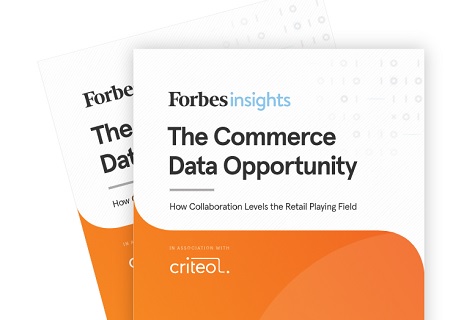Small retailers are willing to fight giants like Amazon by pooling data to remain competitive, according to new research.
The study, from Criteo, surveyed 500 senior marketers globally with Forbes Insights to understand data’s role in ensuring retailers remain competitive in the evolving market.
The report confirms that smaller commerce firms are concerned about the rise of physical-digital giants and their maintenance of walled gardens—controlled data environments owned by a single entity, such as Amazon.com or Facebook, and not in collaboration with others.
Retailers and brands are unsettled by this industry-wide disruption and how it will affect their ability to compete in the marketplace.
Key data points below:
- 62% of retailers agree that large-scale consumer data held within walled gardens (such as at Amazon.com, Facebook, etc) causes consumers to turn away from smaller retailers
- Over half (58%) agree that walled gardens are making it harder to compete overall
- Only 14% believe (and 63% disagree) that walled gardens cause others in the ecosystem to up their game when it comes to collecting and using customer data
Half of the retailers surveyed believe the primary impact of walled gardens on brands is that they limit consumers’ access to brands’ products
Retailers are under increasing pressure from developments like the merger of Amazon.com and Whole Foods.
The top three challenges retailers and brands believe they will have in responding to such developments are:
- Maintaining good margins (64%)
- Maintaining market share (59%)
- Engaging in price competition (49%)
30% of retailers identified ‘better quality data’ as the primary benefit of partnering with walled gardens, but only 4% thought walled gardens could provide a better view of omni-channel data.
41% believe the greatest business outcome of working with a walled garden is improved customer satisfaction – but only 2% think it’s improved loyalty/reduced churn.
Retailers’ top limitation of keeping data within a walled garden was risk of misuse of the data (67%), followed by cybersecurity/violation of privacy – highlighting real concerns around how these companies are using retailers’ consumer data
“Despite the disruptive transformation of the retail industry we are simultaneously witnessing that brands large and small understand the critical importance of data, are working hard to leverage the data they have, and see opportunity in working together to gain an edge,” said Bruce Rogers, Forbes’ Chief Insights Officer. “Data is the great equalizer in this time of division and global executives agree that a shared approach is the key for gaining an upper hand in the battle for consumers’ share of time, attention and wallet.”
Retail Industry Disruption is Reshaping Commerce
Brands demonstrate concern that physical-digital giants will limit access to their products, whereas retailers worry this trend will cause consumers to turn away from smaller retailers.
Brands and Retailers Realize Data’s Potential, but Lack Some Confidence
Nearly four out of five brands and retailers include customer data as a key part of their business strategy. But while retailers have access to more data than brands, especially online, they are less confident than brands in their ability to turn data into actionable insights. Bottom line: more data alone doesn’t necessarily translate into a greater ability to take action.
Pooled Data Assets are a Powerful Way to Get Ahead
Brands and retailers see value in collaboration and pooling data assets to meet customer needs and drive value for their business. In fact, 71 percent of brands and retailers are willing to contribute data to a pool. And, three-fifths of those surveyed are already part of a data cooperative, with seven out of 10 of those companies already happy with their collaborations as well as the data they receive. Additionally, 72 percent of marketers cite “increased revenue” as a key benefit they experience from pooled data.
Value Drives Everything
Forward-thinking brands and retailers know that data is the key to providing value, and seven out of 10 believe their customers are satisfied with their use of data to deliver more targeted marketing. 9 out of 10 companies report placing even greater importance on delivering true value as a business driver during the past two years.
Quality and Confidentiality Chief Concerns: When it comes to data, 66 percent of marketers report that the biggest challenge they have with customer data is “ensuring quality data” and 65 percent cite “confidentiality of data” as being a top challenge in the context of pooled customer data assets.
“Global marketing executives are fully aware of the disruption the industry faces. Leading CMOs are taking bold steps to capitalize on the opportunity created by this disruption.” said Eric Eichmann, CEO, Criteo. “Understanding the value of data collaboration and pooling data is a massive step forward. Doing this within the Criteo Commerce Marketing Ecosystem, which holds a massive pool of granular shopper data and provides access to one of the best media inventory in the industry, will uniquely enable retailers and brands to connect more shoppers to the things they need and love, maximizing thus their sales and profits.”
Study Methodologies
Conducted by Forbes Insights the “The Commerce Data Opportunity: Collaboration Levels the Retail Playing Field” study was based on a survey of 504 marketing executives from $50M+ companies in several industries, including department stores, fashion and clothing, and food and drink. Participants were senior vice presidents or higher, and half were chief marketing officers from five countries—France, Germany, Japan, United Kingdom, and the United States.
View the report here:
The Commerce Data Opportunity: Collaboration Levels the Retail Playing Field
